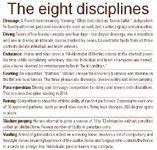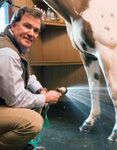DVMs to play key role in 2010 World Equestrian Games
Lexington, Ky. - Not even a team of horses will be able to keep Dr. Kent Allen, a Middleburg, Va., DVM who specializes in equine sports medicine, away from this city three and a half years from now.
LEXINGTON, KY. — Not even a team of horses will be able to keep Dr. Kent Allen, a Middleburg, Va., DVM who specializes in equine sports medicine, away from this city three and a half years from now.

DVM coordinator for games: Dr. Kent Allen, a specialist in equine sports medicine, will supervise up to 200 veterinarians at the World Equestrian Games. "Part of our assignment is just to make these games a fun, pleasant experience for everyone," he says.
That's when the 2010 World Equestrian Games – the largest equestrian sporting event ever held in the United States – will gallop into the heart of Kentucky horse country.
The 16-day competition is expected to draw 500,000 to 700,000 spectators from around the world to Lexington's Kentucky Horse Park.
The event may seem a long way off, but preparations already are well under way by the host organization, which has set up headquarters in a renovated barn just down the road from the 1,200-acre, state-of-the-art equine theme park.
High on the agenda is the assembling a team of more than 100 – perhaps as many as 200 – DVMs, most of whom will volunteer their time to perform the critical functions of judging, treating and required medication (doping) testing of 900 horses representing more than 60 nations.

Fast facts
As veterinary services coordinator, Allen will oversee the selection of the DVM pool, organize it into task groups and monitor all veterinary functions while athletes compete for world championships in eight equestrian disciplines – show jumping, dressage, eventing, driving, endurance, vaulting, reining and para-equestrian.
He brings considerable experience to the job. He was veterinary coordinator for the 1996 Olympic Games in Atlanta, the top-ranked foreign veterinary delegate at the 2000 Olympic Games in Sydney, Australia, and has served as the United States Equestrian Team (USET) veterinarian on several international teams.
"We had 110 equine vets in Atlanta in 1996. I expect we'll need more than that for the WEG because of the additional disciplines. Perhaps up to 200," Allen says.
Equestrian sport has long been part of the summer Olympic games, but only in three disciplines – stadium jumping, dressage and eventing.
The world games began in 1990 in Sweden, and are held every four years, two years prior to each summer Olympics. They began with six disciplines – the three Olympic events plus driving, endurance and vaulting. Reining was added as a seventh discipline in 2002.

The 2010 games in Lexington will have three important "firsts:"
- This will be the first time the WEG will be held outside of Europe.
- It's the first time all events will be conducted at a single venue (no European venue is as large or has as many facilities as the Kentucky Horse Park).
- It will be the first time that para-equestrian events will be included as an eighth discipline. (Para-equestrian contests involve driving and dressage for riders and drivers with disabilities.)
One of the main concerns for equine veterinarians, Allen says, will be protecting American horses from the tick-borne blood disease piroplasmosis, which is endemic in southern Europe and South America.
All horses entering the United States routinely undergo testing for several diseases during a USDA-mandated quarantine period, but at the games further protocols will be in place, especially for piroplasmosis. "An unaffected horse can still be a carrier," Allen says. (The disease does not present a risk to humans.)
Prior to the 2000 Olympics, piroplasmosis protocols in the United States were so stringent that "p-positive foreign horses weren't even allowed in," Allen recalls. "In Atlanta in 1996, those that did compete couldn't commingle with U.S. horses and had to compete in separate arenas. It created enough of a restrictive atmosphere that many foreign teams didn't bother to participate – there were only three p-positive horses that year – and that didn't make much sense when so much money was spent on promoting and conducting those games."

The eight disciplines
But all that changed after the 2000 Olympics in Sydney. "There we simply stabled the horses separately in wood shavings, which creates a biological barrier to piroplasmosis, shampooed the horses to kill ticks and then they could compete together," Allen recalls. "There must have been about 30 (p-positive) horses who went through that process and were able to compete."
Similar measures, creating a less restrictive environment, have been in place at the world games since then and will be provided, even enhanced, in Lexington, Allen says.
"Besides these precautions, we also know that tick surveys in Kentucky show that few of them are around and active during the time of year the games will be held (Sept. 25 through Oct. 10)."
Some organizers believe these factors may have been instrumental in Lexington winning the bid in 2005 to host the WEG in 2010.
The games are sponsored by Alltech and Federation Equestre Internationale (FEI). The host organization is the World Games 2010 Foundation, Inc. (www.feigames2010.org).
"There couldn't be a better facility for this event than Kentucky Horse Park," says Dr. Catherine Kohn, VMD, professor of veterinary medicine at The Ohio State University, who expects to assist in organizing the DVM pool and serve elsewhere as needed during the games. "There's enough room and facilities there for all the events, and of course plenty of world-class back-up services close by."

On the job: Dr. Kent Allen at work at his practice, Virginia Equine Imaging, in Middleburg, Va.
Rood & Riddle Equine Hospital and Hagyard Equine Medical Institute are within a short distance of the horse park, which hosts more than 60 equine competitions each year. Both Allen and Kohn consider the 27-year-old theme park one of the finest facilities of its kind in the world.
Like Allen, Kohn also has wide experience at equine sporting events. She served as president of the veterinary commission for equine competition at the 1996 Olympic games in Atlanta, and was the ranking foreign delegate at the Pan-Asian Games in Bangkok, Thailand, in 1998.
She isn't certain yet exactly what role she'll have at Lexington. "There's a lot to do, much of it behind the scenes, so not everything we (DVMs) do is publicly visible," she says. "I could work in several areas – wherever I might be needed."
Growing up, Kohn says she frequently was around eventing competitions, and has provided her veterinary skills at many such events over the years – to the point that she knows and is known by many of the athletes.
"It's been an enriching experience," she says. "The world of equestrian sport is small, a close-knit community. I'm lucky to be part of it."
Kohn remembers working at one of the first major equine sports events held at Kentucky Horse Park shortly after it opened – the three-day world championships in eventing – the discipline that is likened to a triathalon for horses, testing them for accuracy, boldness and stamina in dressage, cross-country and show jumping. "It drew about 30,000 people and was a great success," she recalls.
Kohn says it's still a bit early to arrange all the medical protocols for the WEG, but that input from DVMs will be needed early on to help ensure that turf and other surfaces for dressage, cross-country and other disciplines are perfect. "Proper footing for the horses is critical, and that has to be worked on well in advance to be optimal. Vets are involved with that," Kohn says.
One reason Allen believes the Kentucky venue is perfect for the 2010 WEG is that "all the infrastructure is already there for us. We won't need to re-invent the wheel," he says. "We'll probably put up a temporary hospital structure about a year before the games, but it won't have to be too sophisticated – just sufficient for things like suturing minor injuries, treating for exhaustion and the like. For anything more serious, there are the two excellent hospitals just off-site."
The DVMs who will be assembled into a pool over the next three years will be mostly volunteers – from all parts of the country although most probably will come from Kentucky, Allen explains.
Some DVMs will perform medication testing, some are there for treating – strategically placed along the cross-country and marathon courses or at the show rings – and some will serve in a judging capacity. After the grueling, 100-mile endurance event, for instance, veterinarians will choose the horse deemed to be in the best condition from the 10 fastest.
Allen says the 16-day competition will be in two segments – four disciplines during the first eight days, and four in the last eight days. Some vets may work one segment, others both.
"Part of our assignment is just to help make these games a fun, pleasant experience for everyone," Allen says.
"If we do our jobs correctly, most visitors won't even know we (DVMs) were there. Hopefully, they'll just come away with the realization that there were a lot of good, helpful American veterinarians around."
Newsletter
From exam room tips to practice management insights, get trusted veterinary news delivered straight to your inbox—subscribe to dvm360.